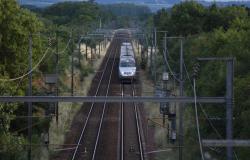The German economy contracted again in 2024, a second year of recession in a row linked to the persistent crisis of the industrial and export model, in a period of political uncertainty marked by legislative elections in February.
Europe's largest economy recorded a fall of 0.2% in its gross domestic product (GDP) in 2024, according to a first estimate, Wednesday January 15, from the Destatis institute. In 2023, GDP had already contracted by 0.3%, weighed down by rising energy costs following the Russian war in Ukraine. In the last quarter of 2024, GDP fell by 0.1% compared to the previous quarter, according to a preliminary estimate from the institute.
The 2024 decline is aligned with the estimates of the government and the German central bank (Bundesbank), while the International Monetary Fund (IMF) was counting, more optimistically, on stagnation.
Read also | Article reserved for our subscribers In Germany, stuck in stagnation, a “dizzying rise in bankruptcies”
Read later
Exports falling
Pillar of the country's economic success, “German exports fell despite overall increase in global trade in 2024”noted Ruth Brand, president of the Destatis institute, during a press conference.
The economic crisis is illustrated above all by the difficulties of the manufacturing industry, including “international competitiveness is under pressure”. Particularly in the automobile industry, the country's major groups are losing ground against their Chinese competitors. Moreover, “households refrained from purchasing despite the increase in their income due to uncertainty about the evolution of the economic situation”.
Despite the decline in activity, the German public deficit remained at 2.6% of GDP in 2024, still below the EU average estimated at 3.1%. Economists are not counting on a rapid rebound: “Everything suggests that 2025 will be the third successive year of recession”commented Jens-Oliver Niklasch of the LBBW bank on Wednesday, increasing the pressure on the government which will be formed following the legislative elections on February 23.
Also read the survey | Article reserved for our subscribers In Germany, the specter of economic decline
Read later






